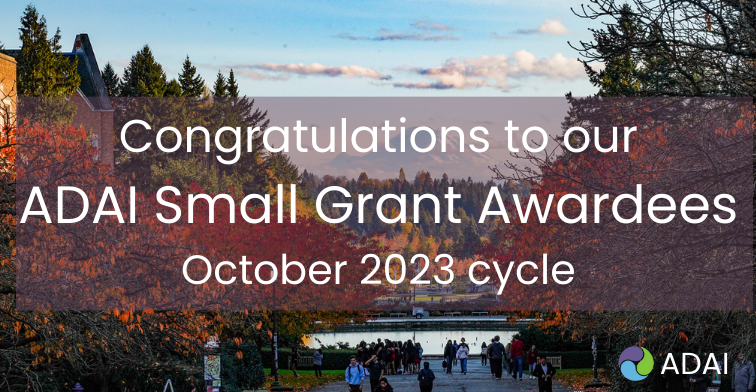Four New ADAI Small Grants Awarded!
01/10/2024
ADAI has been supporting UW research on alcohol and drug use and addiction through its Small Grants Program since it was founded in 1973. Funds from this program go to UW researchers for pilot studies and developmental research, and many of these projects are later developed into full studies with outside funding.
We offer two cycles of small grants each year, with application deadlines in March and October. Read more about this program and learn how to apply (the next deadline is March 15, 2024).
Small Grant recipients from our October 2023 cycle have just been announced! Here are the four exciting projects we’ll be supporting this round (for more details, you can read the complete study abstracts here):
Increasing Resilience from Alcohol-Related Harms: A Pilot Study to Establish a Community-Engaged Research Program Alongside Transgender and Nonbinary Serving Community Organizations and Members
PI: Jessica Canning, PhD (Department of Psychiatry & Behavioral Sciences)
Mentor: Myra Parker, JD, MPH, PhD (Psychiatry)
SBIRT (Screening, Brief Intervention, and Referral to Treatment) is an evidence-based approach to identifying people who use alcohol and other drugs at risky levels and connecting them to appropriate care. This study aims to make components of SBIRT more effective for use with transgender and non-binary adults, with a special focus on the unique intersectional experiences of Latinx and BIPOC people. It will serve as a first step toward improving access to gender-inclusive screening, prevention, and interventions for harmful alcohol use.
Understanding the Neural Markers of Incentive Salience for Cannabis: The Role of Context in Brain-Behavior Relationships
PI: Dani Kang, PhD (Department of Psychiatry & Behavioral Sciences)
Mentor: Natalia Kleinhans, PhD (Radiology)
For this study, 50 non-treatment-seeking young adult cannabis users will be recruited to participate in a laboratory session using functional MRI (fMRI) and records of real-world cannabis use behaviors to gauge “incentive salience” for cannabis cues (i.e., what cues related to cannabis trigger a strong desire to use). These findings will help us better understand what causes Cannabis Use Disorder and how we can help those experiencing it.
The Gut Microbiome as a Causal Mediator and Therapeutic Target of Trauma Induced Alcohol Use: A Pilot Study
PI: Abigail G. Schindler, PhD (VA Puget Sound, Department of Psychiatry & Behavioral Sciences)
Improvised explosive devices (IEDs) are the leading cause of death for service members in the Iraq/Afghanistan wars. Many survivors of IED blasts begin drinking alcohol more often and/or more heavily and develop alcohol use disorder (AUD). This study will use mice to examine the role the gut microbiome, the collection of microorganisms living in a digestive tract, plays in risky alcohol use following blast trauma and whether fecal microbiota transplantation (transplantation of microorganisms from one gut to another using “poopsicles”) impacts that use. Results will help increase our knowledge about how trauma impacts our gut microbiome and drinking behaviors and may help inform a potential new treatment approach.
Measurement and Modeling of Within-Person Variability in Cannabis Protective Behavioral Strategies: A Novel Approach Using Scale Development, Daily Data, and Machine Learning Methods
PI: Kirstyn Smith-LeCavalier, MS (predoctoral student; Department of Psychology)
Mentor: Mary Larimer, PhD (CSHRB)
Frequent, heavy use of cannabis, especially in youth ages 18-25, has short- and long-term consequences. Approaches to help people reduce their use and/or the harms from their use are needed. One way to mitigate harm is to use protective behavioral strategies (PBS) – strategies used before, during, after, or instead of cannabis use to reduce that use or its effects. This study aims to investigate what specific strategies used by a given individual on a given day resulted in less use/harm, which can help improve our understanding of protective behavioral strategies for cannabis, and, in turn, inform future research and development of effective interventions.
Congratulations to all our October 2023 awardees!
Learn how to submit your own Small Grant application here!





